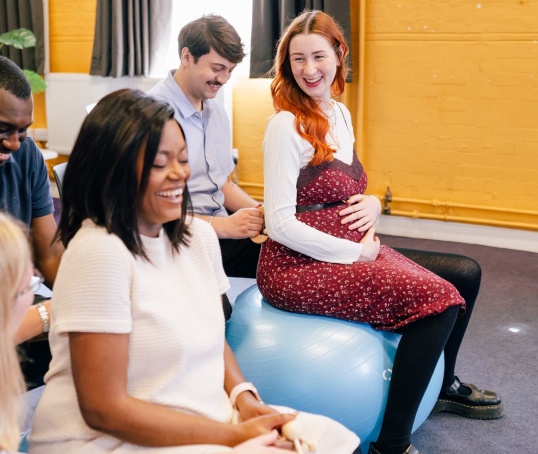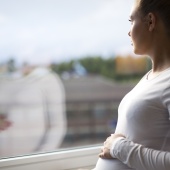In our reproductive lives, hormones work together in complex ways. They are like an orchestra, with each instrument having a role to play. Here we give an overview of how some key hormones are involved in pregnancy and birth.
You can also read our article on common emotions when expecting a baby.
What are some important hormones in pregnancy and birth?
Adrenaline and noradrenaline (add-ren-a-lin and nor-add-ren-a-lin)
The ‘fight or flight’ hormones, which prepare the body to act quickly in times of distress. You might also see these described as Epinephrine and Norepinephrine.
Beta-endorphins (bee-ta-en-door-fins)
The ‘runner’s high’, a brain reward and pain relief. Their effects are similar to opioids such as morphine.
Human Chorionic Gonadotrophin (hCG) (human kor-ee-on-ik go-nad-o-tro-fin)
Released when pregnant and discovered in the pregnancy test.
Oestrogen (ee-stro-gen)
A sex and reproduction hormone in women and birthing parents. You might also see this written as Estrogen.
Oxytocin (oxy-toe-sin)
The caregiving and bonding hormone.
Progesterone (pro-gest-er-own)
Another key reproduction hormone.
Prolactin (pro-lact-in)
A hormone involved with caregiving and milk production.
Prostaglandins (prosta-gland-ins)
Not strictly hormones but have similar role in regulating processes within the body.
Relaxin (re-lax-in)
The relaxing hormone.
Before pregnancy
During each menstrual cycle, hormones are involved in preparing for a possible pregnancy (Society for Endocrinology, 2021a; Society for Endocrinology, 2021b):
- Prostaglandins are involved in releasing an egg from the ovary.
- Progesterone and relaxin get the lining of the womb ready for implantation of a fertilised egg.
Early pregnancy
When a fertilised egg attaches to the lining of the womb, hormones help support the pregnancy and the embryo’s development (Society for Endocrinology, 2024).
- The placenta releases hCG, telling the ovaries to increase production of oestrogen and progesterone. A pregnancy test measures hCG around 11 days after a baby is conceived.
- Oestrogen, progesterone and relaxin support the growth of the placenta.
- Progesterone prevents the release of more eggs.
- Progesterone also maintains and thickens the womb lining. In addition, it signals the lining to meet the baby’s nutritional needs until the placenta takes over at 8-12 weeks.
Other effects of hormonal changes are (Society for Endocrinology, 2024):
- hCG boosts blood flow to the kidneys, producing more urine and increasing the need to wee.
- Relaxin works on the muscles and ligaments to make room for the growing baby. This can cause discomfort and problems with balance.
If there is a drop in the levels of progesterone during pregnancy, it can lead to a miscarriage or early labour. A synthetic form can be given to mothers or pregnant people at risk, to delay labour starting (Society for Endocrinology, 2021a).
As pregnancy progresses
Several hormones support the growing baby and adapting pregnant body (Society for Endocrinology, 2024):
- Relaxin signals for changes in the pregnant woman or person’s body to meet the increased oxygen and nutrients needed for the growing baby.
- Progesterone and relaxin strengthen the uterus, and prevent it contracting too early.
- Oestrogen, progesterone, prolactin and prostaglandins get the breasts ready to produce milk, but the same hormones stop the milk flowing for the moment.
- Prolactin produces milk, which is in the breasts from four months of pregnancy.
- Oestrogen develops the baby’s internal organs.
High levels of oestrogen and progesterone might also lead to the pregnant woman or person experiencing (Society for Endocrinology, 2024; Phupong & Hanprasertpong, 2015; Rao et al, 2022):
- mood swings
- nausea
- heartburn
- constipation
Beta-endorphins rise in pregnancy. They provide pleasure and natural pain relief. Exercise during pregnancy promotes the release of beta-endorphins during labour (Buckley, 2015).
Are there any changes in partners?
Research in fathers shows that they also experience a drop in the hormone testosterone during the pregnancy, which can result in more caregiving and nurturing behaviour (Bakermans-Kranenburg et al, 2019; Edelstein et al, 2015).
End of pregnancy
Towards the end of pregnancy, hormones play a role in starting labour. These hormones can come from both the pregnant woman or person and the baby (Buckley, 2015; Society for Endocrinology, 2021b; Society for Endocrinology, 2024):
- Relaxin softens the pelvic ligaments so the pelvis can open.
- Oestrogen activates pain-relieving pathways in the spinal cord ready for labour and birth.
- Relaxin, prostaglandins, oestrogen and oxytocin soften the cervix and vagina over a period of several weeks.
- Oestrogen prepares the uterus to be receptive to oxytocin in labour.
If labour is being induced, synthetic prostaglandins may be used to try to start it (Society for Endocrinology, 2023).
Women and birthing people who have given birth before are more receptive to oxytocin. This may explain why they tend to have shorter and more straightforward labours (Buckley, 2015).
Early labour
During labour, hormones control contractions and coping mechanisms (Buckley, 2015; Society for Endocrinology, 2024):
- Oxytocin and prostoglandins cause the uterus to contract.
- Beta-endorphins provide pain relief for both mother or birthing parent and baby.
- Beta-endorphins moderate the production of oxytocin for a while if pain levels get too high.
It is thought that self-help methods of pain relief work by promoting beta-endorphins (Buckley, 2015).
The body’s response to feeling unsafe
In early labour, adrenaline could rise in response to external stress or anxiety. This includes subconscious stress. If it no longer feels safe to give birth, the body prepares to ‘run away’ (Buckley, 2015).
Blood is diverted from the uterus and baby to the heart, lungs and muscles to prepare for ‘fight or flight’. As a result labour could slow or stop (Buckley, 2015).
If labour slows or stops it could lead to interventions to speed up labour again. Concern about the baby’s reaction to the reduction in blood oxygen could add to the urgency (Buckley, 2015).
Birth and skin-to-skin
In late labour, adrenaline and noradrenaline create a burst of energy and strong contractions, which help birth the baby (Society for Endocrinology, 2024; Buckley, 2015).
Immediately after the baby is born, hormones are also important (Buckley, 2015; Society for Endocrinology, 2024).
- Oxytocin, beta-endorphins and prolactin generate happiness, bonding and reward.
- Skin-to-skin and eye-to-eye contact promote oxytocin.
- Oxytocin contracts the womb to reduce bleeding and help the placenta detach.
- Prolactin and oxytocin produce milk and milk delivery.
- Beta-endophins release more prolactin while breastfeeding.
When the placenta is born it is no longer sending progesterone and oestrogen to the mother or birthing parent. This means that lactation (milk production) is no longer blocked. It also means the uterus can return to its pre-pregnancy size (Society for Endocrinology, 2024).
The early weeks
Research shows that both parents’ hormones affect how they care for their baby, and that caring for a baby affects fathers’ care-giving hormones (Bakermans-Kranenburg et al, 2019).
There is a positive feedback loop where physical contact with the baby promotes attentiveness and caring in both parents and breastfeeding for the mother or birthing parent. That caring then leads to feelings of love and a desire for physical contact with the baby (Bakermans-Kranenburg et al, 2019; Society for Endocrinology, 2024).
What could affect hormonal activity?
The levels of each hormone during pregnancy and birth controls the timing of different processes for both the baby and the mother or birthing person (Society for Endocrinology, 2024).
For example, the body copes with a labour that starts and proceeds spontaneously by generating hormonal responses. This is called ‘eustress’ (you-stress). These responses include mechanisms to prevent the labour moving into ‘distress’ (Buckley, 2015).
Planned caesarean birth, induction, and epidural will all change the way hormones are in balance. The same is true of separation of the newborn and mother or birthing parent (Buckley, 2015).
Understanding how common maternity practices might interfere with the body’s responses can help parents decide which practices to accept or decline. We aim to include this information in our articles on pregnancy and birth.
Bakermans-Kranenburg, M.J., Lotz, A., Alyousefi-van Dijk, K. and van IJzendoorn, M. (2019) Birth of a Father: Fathering in the First 1,000 Days. Child Dev Perspect, 13: 247-253. https://doi.org/10.1111/cdep.12347
Buckley SJ. (2015) Hormonal physiology of childbearing: Evidence and implications for women, babies, and maternity care. Washington, D.C.: Childbirth Connection Programs, National Partnership for Women and Families. http://www.nationalpartnership.org/research-library/maternal-health/hormonal-physiology-of-childbearing.pdf [6 Jan 25]
Edelstein, R.S., Wardecker, B.M., Chopik, W.J., Moors, A.C., Shipman, E.L. and Lin, N.J. (2015) Prenatal hormones in first-time expectant parents: Longitudinal changes and within-couple correlations. Am. J. Hum. Biol., 27: 317-325. https://doi.org/10.1002/ajhb.22670
Phupong V, Hanprasertpong T. (2015) Interventions for heartburn in pregnancy. Cochrane Database of Systematic Reviews, Issue 9. Art. No.: CD011379. https://doi.org/10.1002/14651858.CD011379.pub2
Rao, SSC; Qureshi, WA.; Yan, Y; Johnson, DA (2022) Constipation, Hemorrhoids, and Anorectal Disorders in Pregnancy. The American Journal of Gastroenterology, 117(10S):p 16-25. https://doi.org/10.14309/ajg.0000000000001962
Society for Endocrinology (2021a) Progesterone. https://www.yourhormones.info/hormones/progesterone/ [6 Jan 25]
Society for Endocrinology (2021b) Relaxin. https://www.yourhormones.info/hormones/relaxin/ [6 Jan 25]
Society for Endocrinology (2023) Prostaglandins. https://www.yourhormones.info/hormones/prostaglandins/ [6 Jan 25]
Society for Endocrinology (2024) Hormones in pregnancy and labour. https://www.yourhormones.info/explore/discover/hormones-in-pregnancy-an… [6 Jan 25]







